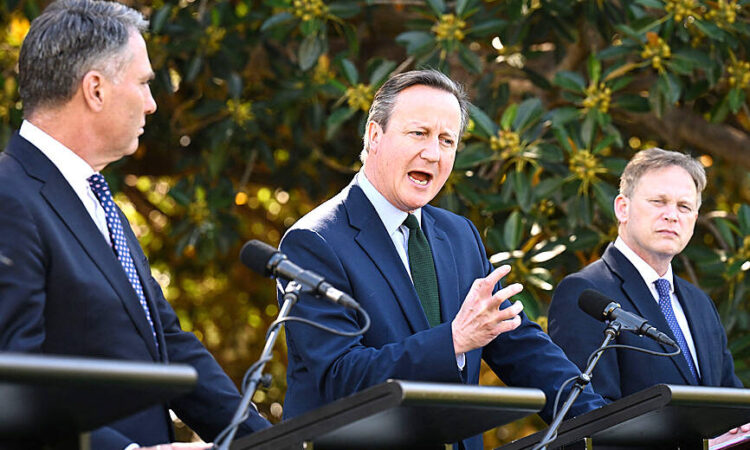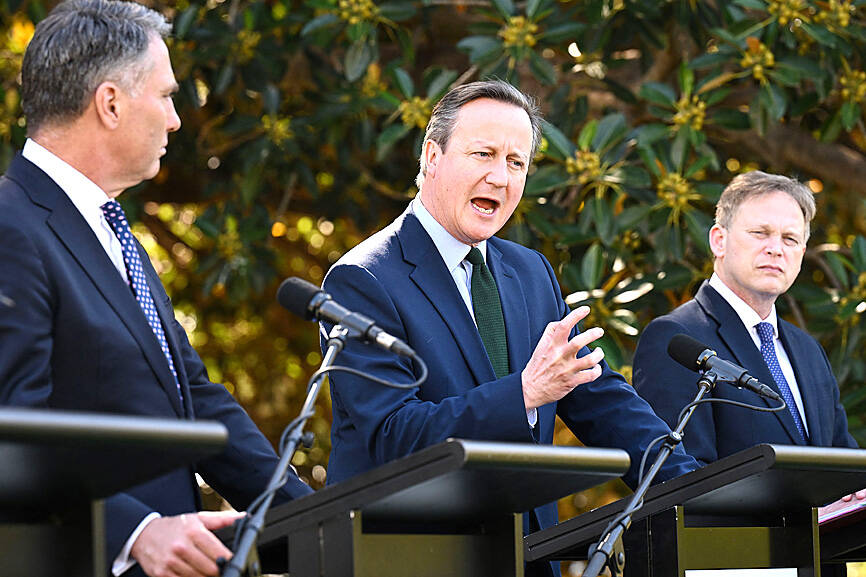
GLOBAL ECONOMY:
A blockade would have an absolutely calamitous effect not just on Taiwan, but on the global economy, British Foreign Secretary David Cameron said
-
By Liu Tzu-hsuan / Staff reporter
A blockade of Taiwan would be catastrophic for the global economy, British Secretary of State for Foreign, Commonwealth and Development Affairs David Cameron told Australian Broadcasting Corp in a program that aired on Thursday.
A possible Chinese invasion or a blockade of Taiwan “is clearly something we’re very concerned about,” Cameron said in an interview with the broadcaster’s 7.30 program.
“There’s no doubt that were there to be something like a blockade, it would have an absolutely calamitous effect not just on Taiwan, but on the global economy,” which would be more significant than the impact of the COVID-19 pandemic, he said.

Photo: AFP
The UK is opposed to any unilateral action from either side of the Taiwan Strait that challenges the “status quo,” he said.
He called on partners of the UK to cooperate in deterring Beijing, adding that messages should be sent to non-allied countries that a cross-strait contingency would also affect them “very, very badly.”
Asked about Beijing’s rapid military buildup, he said that China has become “much more assertive” in recent years and the UK perceives the approach to be “an epoch-defining challenge.”
China’s concerning behavior, such as with its treatment of Hong Kong and the Uighurs, underline “the need for Britain and Australia and like-minded partners to work together,” he said.
As such, the UK has formed the AUKUS partnership with the US and Australia to share military technology and help Australia acquire nuclear-powered submarines to invest in the security of the countries and the Indo-Pacific region, he said.
The region “is vital for the world’s prosperity and for our prosperity,” and like Russia’s invasion of Ukraine, regional events would have global ramifications, he said.
Separately, Cameron and UK Secretary of Defence Grant Shapps, along with their Australian counterparts Minister for Foreign Affairs Penny Wong (黃英賢) and Minister for Defence Richard Marles, “underscored the importance of peace and stability across the Taiwan Strait” in a joint statement issued after the Australia-UK Ministerial Consultations held yesterday in Adelaide.
They called for “the peaceful resolution of cross-strait issues without the threat or use of force or coercion” and reaffirmed “shared opposition to unilateral changes to the status quo,” it said.
They also pledged to support Taiwan’s meaningful participation in international organizations and foster closer ties with the nation in the economic, scientific, trade, technological and cultural fields.
In Taipei, the Ministry of Foreign Affairs yesterday issued statements to thank Cameron and the ministers for their concerns about the cross-strait situation.
Meanwhile, the Ministry of National Defense yesterday announced the highest single-day number of Chinese military aircraft around the nation this year, which analysts attributed as a reaction to Taiwan’s political outreach to Europe in recent days.
In the 24 hours leading up to 6am yesterday, the ministry said it had detected 36 Chinese military aircraft and six naval ships operating around Taiwan.
Among the aircraft detected, 13 had crossed the median line of the Taiwan Strait, it added.
The announcement comes on the heels of nighttime activity by the Chinese military, with the ministry announcing at about 10:30pm on Thursday that 20 fighter jets, aerial uncrewed vehicles and transport planes had been detected from 7:30pm.
It was also the day after an uptick in activity during the 24-hour period ending at 6am on Thursday, when the ministry said Beijing had sent in 32 aircraft.
Vice president-elect Hsiao Bi-khim (蕭美琴) has been travelling in recent days, including to the Czech Republic and the European Parliament.
“Our fight for freedom and democracy is more shared than ever, and the Taiwanese people can rest assured it will always find dear friends in Europeans,” French politician and Member of the European Parliament Dominique Riquet wrote on X on Thursday.
Analyst Sung Wen-ti (宋文笛) said Beijing’s jump in military activity might be a “show of force to drive home its displeasure at Taiwan’s growing international engagement.”
“If this can discourage other international leaders from meeting Hsiao in the future, all the better from Beijing’s perspective,” he said.
Military expert Su Tzu-yun (蘇紫雲) agreed that Hsiao’s European travels could play a motivating factor, but pointed to Asia for added reasons, including a recent Manila meeting between US Secretary of State Antony Blinken and Philippine President Ferdinand Marcos Jr.
Comments will be moderated. Keep comments relevant to the article. Remarks containing abusive and obscene language, personal attacks of any kind or promotion will be removed and the user banned. Final decision will be at the discretion of the Taipei Times.






